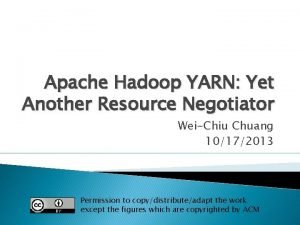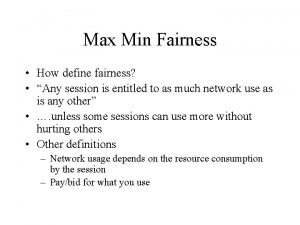Negotiator Policy and Configuration Greg Thain Fairness in

































































- Slides: 65

Negotiator Policy and Configuration Greg Thain


Fairness in HTCondor and how to avoid it

Agenda › Understand role of negotiator › Learn how priorities work › Learn how quotas work › Encourage thought about possible policies!

Overview of condor 3 sides Execute Submit Central Manager

Negotiation Mission Assign the slots of the whole pool to users based on some policy that’s ‘fair’

Negotiator Inputs › › All the slots in the pool All the submitters’ priorities and quotas One request per submitter at a time

How the Negotiator Works Periodically tries to: Rebalance %age of slots assigned to users Via preemption, if enabled Via assigning empty slots if not Negotiator is always a little out of date

Main Loop of Negotiation Cycle* 1. Get all slots in the pool 2. Get all jobs submitters in pool 3. Compute # of slots submitters should get 4. In priority order, hand out slots to submitters 5. Repeat as needed

The Negotiator as Shell Script 1. Get all slots in the pool 2. Get all jobs submitters in pool 3. Compute # of slots submitters should get 4. In priority order, hand out slots to submitters 5. Repeat as needed

1: Get all slots in pool

1: Get all slots in pool $ condor_status

1: Get all slots in pool $ condor_status –af Name State Remote. Owner slot 1@. . . slot 2@. . . slot 3@. . . slot 4@. . . slot 5@. . . slot 6@. . . slot 7@. . . slot 8@. . . Claimed Alice Unclaimed undefined Claimed Bob Claimed Charlie

1: Get all slots in pool $ condor_status –af Name Remote. Owner Slots Alice Bob Charlie Unclaimed

2: Get all submitters in pool $ condor_status -submitters

2: Get all submitters in pool $ condor_status -submitters Name Alice Bob Charlie Danny Machine submit 1 Running. Jobs Idle. Jobs 4 4 2 100 2 0 0 50

2: Get all submitters in pool $ condor_status -submitters Name Alice Bob Charlie Danny Machine submit 1 Running. Jobs Idle. Jobs 4 4 2 100 2 0 0 50

3: Compute per-user “share” › Tricky › Based on historical usage

3 a: Get historical usage $ condor_userprio -all

3 a: Get historical usage $ condor_userprio -all User. Name Effective Real Priority Alice 3100 3. 1 Bob 4200 4. 2 Charlie 1500 1. 5 Danny 8200 8. 2 Priority Res Factor in use 1000 4 1000 2 1000 0

3 a: Get historical usage User. Name Effective Real Priority Alice 3100 3. 1 Bob 4200 4. 2 Charlie 1500 1. 5 Danny 8200 8. 2 Priority Res Factor in use 1000 4 1000 2 1000 0

So What is Real Priority? Real Priority is smoothed historical usage Smoothed by PRIORITY_HALFLIFE defaults 86400 s (24 h)

Actual Use vs Real Priority

Another PRIORITY_HALFLIFE = 1

3 a: Get historical usage $ condor_userprio -all User. Name Effective Real Priority Alice 3100 3. 1 Bob 4200 4. 2 Charlie 1500 1. 5 Danny 8200 8. 2 Priority Res Factor in use 1000 4 1000 2 1000 0

Effective priority: › Effective Priority is the ratio of the pool that the negotiator tries to allot to users Lower is better, 0. 5 is the best real priority

User. Name Effective Real Priority Alice 1000 1. 0 Bob 2000 2. 0 Charlie 2000 2. 0 Priority Res Factor in use 1000 4 1000 2 Alice deserves 2 x Bob & Charlie Alice: 4 Bob: 2 Charlie: 2 (Assuming 8 total slots)

So What is Priority Factor? User. Name Effective Real Priority Alice 1000 1. 0 Bob 2000 2. 0 Charlie 2000 2. 0 Priority Res Factor in use 1000 4 1000 2 Priority factor lets admin say If equal usage, User A gets 1/nth User B $ condor_userprio –setfactor alice 5000

3 different Prio. Factors

Whew! Back to negotiation 1. Get all slots in the pool 2. Get all jobs submitters in pool 3. Compute # of slots submitters should get 4. In priority order, hand out slots to submitters 5. Repeat as needed

Target allocation from before User Effective Priority Goal Alice Bob Charlie 1, 000. 00 2, 000. 00 4 2 2 Assume 8 total slots (claimed or not)

Look at current usage User Effective Priority Goal Current Usage Alice Bob Charlie 1, 000. 00 2, 000. 00 4 2 2 3 1 0

Diff the goal and reality User Effective Priority Goal Current Usage Difference (“Limit”) Alice Bob Charlie 1, 000. 00 2, 000. 00 4 2 2 3 1 0 1 1 2

“Submitter Limit” per user User Effective Priority Goal Current Usage Difference (“Limit”) Alice Bob Charlie 1, 000. 00 2, 000. 00 4 2 2 3 1 0 1 1 2

Limits determined, matchmaking starts In Effective User Priority order, Find a schedd for that user, get the request User Effective Difference Priority (“Limit”) Alice Bob Charlie 1, 000. 00 2, 000. 00 1 1 2

“Requests”, not “jobs” $ condor_q –autocluster Alice Id Count Cpus Memory Requirements 20701 10 1 2000 Op. Sys == “Linux” 20702 20 2 1000 Op. Sys == “Windows”

Match all machines to requests Id 20701 Count Cpus Memory Requirements 10 1 2000 Op. Sys == “Linux” slot 1@. . . slot 2@. . . slot 1@. . . Linux WINDOWS X 86_64 X 86_64 Idle Claimed 2048 1024

Sort All matches By 3 keys, in order NEGOTIATOR_PRE_JOB_RANK NEGOTIATOR_POST_JOB_RANK

Why Three? NEGOTIATOR_PRE_JOB_RANK Strongest, goes first over job RANK Allows User some say NEGOTIATOR_POST_JOB_RANK Fallback default

Finally, give matches away! slot 1@. . . Linux slot 2@. . . Linux slot 1@. . . Linux X 86_64 Unclaimed 2048 X 86_64 Claimed 2048 Up to the limit specified earlier If below limit, ask for next job request

Done with Alice, on to Bob User Effective Difference Priority (“Limit”) Alice Bob Charlie 1, 000. 00 2, 000. 00 1 1 2

But, it isn’t that simple… › Assumed every job matches every slot And infinite supply of jobs! › … But what if they don’t match? There will be leftovers – then what?

Lather, rinse, repeat This whole cycle repeats with leftover slots Again in same order…

Big policy question › Preemption: Yes or no? › Tradeoff: fairness vs. throughput › (default: no preemption)

Preemption: disabled by default PREEMPTION_REQUIREMENTS = false Evaluated with slot & request ad. If true, Claimed slot is considered matched, and Subject to matching

Example PREEMPTION_REQs PREEMPTION_REQUIREMENTS= Remote. User. Prio > Submittor. Prio * 1. 2

PREEMPTION_RANK › Sorts matched preempting claims PREEMPTION_RANK = -Total. Job. Run. Time

Whew! › Now, on to Groups.

First Accounting. Group › › › Accounting. Group as alias Accounting_Group_User = Ishmael “Call me Ishmael” With no dots, and no other configuration Means alias: Maps “user” to “submitter” Complete trust in user job ad (or xform) • Viz-a-vis SUBMIT_REQUIREMENTs

User Effective Accounting Priority Group Alice Bob Charlie 1, 000. 00 2, 000. 00 “Alice” Merged to one user No fair share between old Alice and old Bob!

Accounting Groups With Quota Only way to get “quotas” for users or groups

Group Quotas: Big Picture w/o quotas: Assign submitters

Group Quotas: Big Picture To the whole pool Slots in whole pool Alice Bob Danny Unclaimed

Submitters opt into Groups Group A Group B Group C

1 st: Each group gets a “Quota” Group Quota Group A 200 slots Group B 100 slots Group C 500 slots (How? We’ll get to that)

nd 2 : Make virtual sub-pool per group Group Quota Group A 200 slots Group B 100 slots Group C 500 slots Group B: Group A: 100 pool slots 200 slots 800 Slots in whole Bob Alice. . . Group C: 500 slots Alice Bob Danny Edgar Fran Unclaimed

rd 3 : Do fair share with each subpool in group turn Group Quota Group A 200 slots Group B 100 slots Group C 500 slots Group A: Group. C: B: Group 200 slots 100 slots 500 Alice. . . Bob Danny Edgar Fran Groups with > 1 submitter get fair share with prios as usual, but total size of the pool is the quota size

Accounting Groups with quotas › Must be predefined in config file GROUP_NAMES = group_a, group_b GROUP_QUOTA_GROUP_A = 10 GROUP_QUOTA_GROUP_B = 20 Slot weight is the unit – default cpus

And jobs opt in (again) Accounting_Group = group_a But you retain identity within your group.

Acct. Groups w/quota › Reruns the whole cycle as before h. But with pool size constrained to quota h. And fair share, between users in group

Order of groups? › By default, in starvation order › Creates overprovisioning trick for strict fifo: › GROUP_QUOTA_HIPRIO = 10000 › Means this group always most starving › GROUP_SORT_EXPR overrides

Quotas can leave slots idle › If Group’s demand < quota › Slots left idle › Can we go over quota in this case?

Going over quota, slots available One way is: GROUP_AUTO_REGROUP = true After all groups go, one last round with no groups, every user outside of their group.

2 nd way to over quota › “Surplus” › Assumes a hierarchy of groups: GROUP_NAMES = group_root, group_root. a, group_root. b, group_root. c GROUP_QUOTA_GROUP_root = 60 GROUP_QUOTA_GROUP_root. a = 10 GROUP_QUOTA_GROUP_root. b = 20 GROUP_QUOTA_GROUP_root. b = 30 GROUP_ACCEPT_SURPLUS = true

In summary › Negotiator is very powerful, often ignored › Lots of opportunity to tune system › Many ways to peak under the hood
 Jenny thain
Jenny thain Characteristics of a good negotiator
Characteristics of a good negotiator What is yet another resource negotiator
What is yet another resource negotiator Primary negotiator
Primary negotiator What makes a good negotiator
What makes a good negotiator Absolute configuration
Absolute configuration Chiral or achiral
Chiral or achiral Electron configuration vs noble gas configuration
Electron configuration vs noble gas configuration Difference between absolute and relative configuration
Difference between absolute and relative configuration Global context ib
Global context ib Fairness and diversity in the workplace
Fairness and diversity in the workplace John rawls theory of justice
John rawls theory of justice Fairness and flawless ceo
Fairness and flawless ceo Justice as fairness
Justice as fairness Avoiding discrimination through causal reasoning
Avoiding discrimination through causal reasoning Dominant resource fairness
Dominant resource fairness Fairness slippery slope
Fairness slippery slope Max-min fairness example
Max-min fairness example Fairness scenarios
Fairness scenarios The fairness doctrine
The fairness doctrine The fairness doctrine
The fairness doctrine Procedure justice
Procedure justice Fairness
Fairness Fairness
Fairness Keva fairness cream
Keva fairness cream Max-min fairness
Max-min fairness Substantive fairness
Substantive fairness Fairness adjective
Fairness adjective Greg and the ballistic missile
Greg and the ballistic missile Greg kesden cmu
Greg kesden cmu Teseq esd
Teseq esd Gregory reznik
Gregory reznik Where are liver flukes found
Where are liver flukes found Greg camm
Greg camm Greg gordon md
Greg gordon md John szyc
John szyc Dave provenzano
Dave provenzano Kentucky physicians health foundation
Kentucky physicians health foundation Greg tielke
Greg tielke Greg ashman
Greg ashman Greg dudkin
Greg dudkin Gstitt
Gstitt Greg stitt
Greg stitt Onderwereld literere opstelle konflik
Onderwereld literere opstelle konflik Greg kuperberg
Greg kuperberg Greg michaelson
Greg michaelson Greg thomson missing
Greg thomson missing Greg whalley
Greg whalley Greg badros
Greg badros Greg blumenthal
Greg blumenthal Greg hoglund
Greg hoglund Greg kelly calculus
Greg kelly calculus Characters in diary of a wimpy kid
Characters in diary of a wimpy kid Greg clevenger
Greg clevenger Alive seminars
Alive seminars The treasure of lemon brown character traits
The treasure of lemon brown character traits Dr greg bosshardt
Dr greg bosshardt Greg moore physics
Greg moore physics Greg cibuzar
Greg cibuzar Cloud computing programming models
Cloud computing programming models Greg baldini
Greg baldini Greg scagliotti
Greg scagliotti Greg jarboe
Greg jarboe Greg mossop
Greg mossop Greg tang halloween math challenge
Greg tang halloween math challenge Greg crooks
Greg crooks
























































































